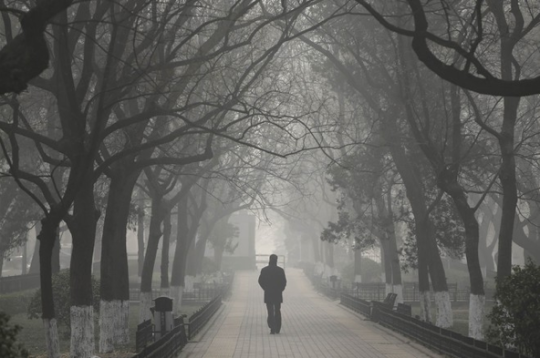
Image Jason Lee/Reuters, via WSJ
The heavy smog that’s defiled our skies is reportedly causing very real problems on the ground, too — anecdotally, at least, as Bloomberg reports:
“The number of people coming into our emergency room suffering heart attacks has roughly doubled since Friday when the air pollution became really severe,” Ding Rongjing, deputy head of cardiology at Peking University People’s Hospital said in a telephone interview yesterday.
You could fill a small library shelf with scientific studies that have linked air pollution to cardiovascular disease, so perhaps it shouldn’t be considered breaking news that five successive days of “hazardous” air might cause an uptick in medical emergencies. For more unsettling reading — if you live in China, here’s where you switch on your cognitive dissonance filter – here’s the New York Times’s Well blog:
The smallest particles of pollution, those finer than 2.5 microns in diameter — or about one-thirtieth the width of a human hair — are particularly effective at infiltrating the body, the researchers noted. There is some evidence that they can even penetrate the brain through the nasal passages, said Jennifer Weuve, the lead author of a third study, also published in The Archives of Internal Medicine, linking pollution to cognitive decline.
This probably won’t make you feel any better, but emergency plans have been enacted in Beijing. Bloomberg again:
Beijing yesterday started its emergency-response plan to the severe pollution, which included ordering government vehicles off the roads to cut usage by 30 percent, according to Xinhua, citing Yu Jianhua, director of the city environmental protection bureau’s air quality department.
The plan also calls for construction sites to limit activity that creates large amounts of dust and asks industrial companies to reduce emissions. Residents are advised to stay indoors and use public transport if they need to go out, while primary schools should reduce outdoor activities, Xinhua said.
Highways closed, flights delayed, social unrest stirred… however, there is some good news. The AQI has remained below 400 for each of the last five hours:
01-14-2013 14:00; PM2.5; 307.0; 357; Hazardous (at 24-hour exposure at this level)
— BeijingAir (@BeijingAir) January 14, 2013
And we can see the literal (blue) light at the end of the tunnel, thanks to Xinhua:
The pollution is expected to engulf Beijing until Wednesday, when wind will arrive to blow the smog away, according to a weather report from the meteorological station.
Hang in there, everybody. We’re gonna make it.
UPDATE, 2:51 pm: Counterpoint:
@beijingcream It's not: http://t.co/islACvBL
— Sascha Matuszak (@SaschaMatuszak) January 14, 2013
Beijing Orders Official Cars Off Roads to Curb Pollution (Bloomberg)

















































Yeah just wait for the wind to blow it away to other areas. Don’t bother trying to fix it. Stay classy China!
What they should do, and never will do, is stop all traffic, construction, and local factories until the PM 2.5 reaches 35 microns per cubic meter, which is still dangerous, but much better than 888! Also, make a law requiring electric vehicles only within the next 5 years.
I am not sure about Beijing, but in Shanghai, the government actions licence plates to limit, they say, the amount of vehicles on the roads, but in reality, such limitations just mean more cars carrying out of town plates. So having an in-town only plate policy would do wonders in Shanghai at least.
Another measure to combat air pollution and alleviate the dangers on Chinese city roads would be to start strictly enforcing road rules and banning drivers for point losses 1st offence 6 months, 2nd 1 year, 3rd 3 years. This would empty city streets in a hurry.
Another solution would be to follow and enforce the emissions standards of developed cities like Tokyo that have far more people and far more cars than Beijing or Shanghai (greater Tokyo has about 30 million). The air in Tokyo is easily 100 times cleaner than Beijing or Shanghai on it’s dirtiest day (coincidentally, bad air in Tokyo typically comes from, you guessed it, China!). Also, developing better public transport, like Tokyo, would also help. (Did you know you can see the Tokyo Sky Tree up to 70 km away?! The Pudong towers are sometimes invisible from across the HongPu! And are only visible 30 km away about 3 days a year!)
And perhaps the most important measure, which might actually be doable in this workers paradise would be to remove everyone who does not have a city registration from China’s cities and send them back to the farm. China is the worlds 3rd largest country with the world’s greatest number of people. Is there any damn reason why half of them should all live in 9 or 10 major cities? China does have “uninhabited zones” believe it or not. Send every waidiren home or to those zones and the air in Chinese cities would improve greatly.